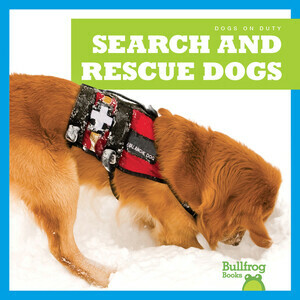Furry sea otters float through a kelp forest, munching on sea urchin snacks and dipping below the waves. All around them, the kelp forest is bursting with life--from fish and snails, to sea… More →
Animals
1121 records found. Displaying 901 - 912.
Whether it's there's an avalanche, a mudslide, or a collapsed building, you can bet four paws will help dig through the debris to find people who are trapped. Search and Rescue dogs respond… More →
In Search and Rescue Dogs, beginning readers will learn about dogs that work after natural disasters and in the wilderness to find and save missing people. Vibrant, full-color photos and… More →
Sea scorpions were the biggest arthropods to ever exist. The biggest grew over 8 feet long! In this hi/lo title, readers will discover the lives of sea scorpions as they swam through… More →
Sea snakes are skilled underwater breathers able to spit out stored saltwater with their tongues. Kids will learn what these ocean creatures look like, how they swim and thrive in water, and… More →
Sea Snakes
Sea snakes make their homes in coral reefs around the world. These snakes spend most of their time underwater! In this book, readers will learn about the lives, habitat, and hunting habits of More →
Sea turtles are long-distance swimmers! These travelers cross oceans every year. Young students can learn basic facts about these marine reptiles through easy-to-read text and vibrant photos… More →
In this book, early fluent readers will learn how sea turtles live and survive in the ocean. Vibrant, full-color photos and carefully leveled text will engage young readers as they learn more More →
















